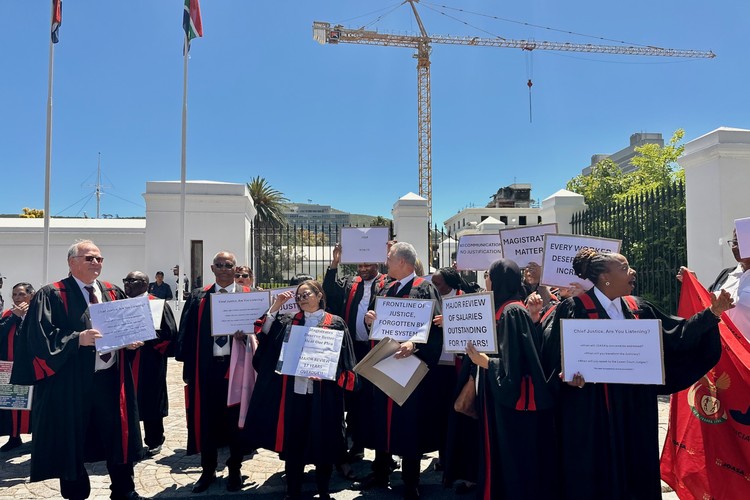Magistrates protest outside Parliament
Magistrates are demanding salary increases and better working conditions
About 30 magistrates protested outside Parliament at lunch time on Wednesday afternoon. Photo: Zora Hollie
About 30 magistrates protested outside Parliament at lunch time on Wednesday. They were demanding salary increases and better working conditions. A Parliamentary representative accepted their petition on behalf of the presidency.
The magistrates came from across the country, including KwaZulu-Natal, Gauteng and the Western Cape. Dressed in their robes, they held signs that read: “Magistrates Matter” and “Justice for Justice Workers.”
Magistrate Mondli Nhlangulela said magistrates are the “forgotten child of the judiciary”, and their salaries have not kept pace with inflation.
“We can’t afford school fees for children,” Nhlangulela said. “It is a dire situation … Sometimes you can’t even make it to work because you can’t put fuel in your car.”
Magistrates currently earn around R1.1-million a year, but Magistrate Neelan Karikan, president of the Judicial Officers Association of South Africa, said much of this goes in tax.
Magistrates we spoke to said they want similar benefits to judges, such as a car and housing allowances and medical aid. They also want lifelong salaries, as is the case with judges, instead of the pensions from the government pension fund.
Magistrate Rohan Roopnarian said magistrates lack resources. Several magistrates expressed safety concerns about having to share bathrooms with the public.
“We are the coal face of the judiciary,” Roopnarian said. “95% of the work in the court is done by us, but we don’t get the recognition and the status we deserve.”
Magistrate Denni Leppan, 35 years on the bench, said she hopes their remuneration package is completely restructured and their demands are addressed in a major review, which she said is 17 years overdue.
In 2008 in its first major review, the Independent Remuneration Commission acknowledged that the remuneration gap between the lowest-paid judge and highest-paid magistrate was “too wide and unjustifiable”.
Earlier this year, after being taken to court, the President referred the latest review (2024) back to the commission with questions. The Minister of Justice is expected to address the matter in the National Council of Provinces on Thursday.
“The IRC seems to have not been doing their job, inclusive of our president,” said Karikan, “because he had the major review about a year ago, and he didn’t sign off on it and implement it in Parliament.”
Earlier this month, magistrates picketed outside the court in Durban with similar demands.
Magistrates’ Commission secretary Maritshane Finger had not responded at the time of publication.
Support independent journalism
Donate using Payfast

Don't miss out on the latest news
We respect your privacy, and promise we won't spam you.
Next: KwaZulu-Natal Premier promises funds for special schools
Previous: Sink holes open up again beneath shacks in Khayelitsha
Letters
Dear Editor
I stand in full solidarity with all magistrates who gathered outside Parliament on 30 October 2025 to demand fair remuneration and better working conditions. Your call for recognition and justice within the judiciary is both timely and justified.
Magistrates are the backbone of South Africa’s judicial system, handling nearly 95% of all court matters. Yet, despite this enormous responsibility, their remuneration remains far below that of judges. A magistrate currently earns about R1.1-million per annum, while a High Court judge earns approximately R1.99-million, and judges of the Supreme Court of Appeal or Constitutional Court receive around R2.46-million annually. Beyond the salary gap, judges enjoy benefits such as housing and car allowances, comprehensive medical aid, security provisions and lifelong salaries, whereas magistrates rely on standard pensions and bear the rising costs of living without equivalent support.
This disparity undermines both morale and judicial independence. It is unacceptable that those who serve at the coalface of justice, often in under-resourced and unsafe environments, must struggle to afford basic expenses like transport and school fees. The magistracy deserves parity in remuneration, resources, and respect.
The last major remuneration review occurred in 2008, when even the Independent Commission acknowledged the gap between judges and magistrates as “too wide and unjustifiable”. Seventeen years later, that gap persists. It is imperative that the President and the Independent Remuneration Commission act urgently to implement a fair, transparent and sustainable remuneration framework that reflects the true value of the magistracy’s work.
To all magistrates: your dedication sustains the justice system. Your struggle for equity is not only about salaries—it is about dignity, recognition, and the integrity of the judiciary itself. You have our unwavering support.
Yours in solidarity.
© 2025 GroundUp. This article is licensed under a Creative Commons Attribution-NoDerivatives 4.0 International License.
You may republish this article, so long as you credit the authors and GroundUp, and do not change the text. Please include a link back to the original article.
We put an invisible pixel in the article so that we can count traffic to republishers. All analytics tools are solely on our servers. We do not give our logs to any third party. Logs are deleted after two weeks. We do not use any IP address identifying information except to count regional traffic. We are solely interested in counting hits, not tracking users. If you republish, please do not delete the invisible pixel.

